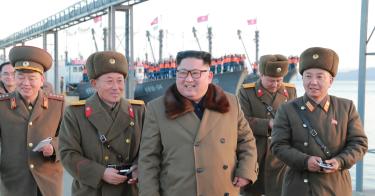New sanctions against North Korea, issued by the Department of Treasury on Dec. 10, designated three North Koreans for censoring and restricting access to information in the Hermit Kingdom.
The three officials, Jong Kyong Thaek, Choe Ryong Hae, and Pak Kwong Ho, play a critical role in ensuring ideological purity and the continuation of the propaganda of the Kim regime.
Treasury’s actions, taken on Human Rights Day, send North Korea the message that U.S. policy is about more than just denuclearization.
North Korea ranks among the world’s worst human rights abusers. Hundreds of thousands, possibly even millions, have perished in the country’s brutal political prison camps.
People are killed in broad daylight for crossing the Kim regime. Defectors share stories of starvation, forced abortions, and watching three generations of their family languish, even die, in North Korea’s modern-day gulags.
Many of those same defectors fled from Pyongyang’s grip because they had access to outside information.
Watching a South Korean drama or listening to radio programs from churches, nongovernmental organizations and fellow North Koreans who defected before them convinced them that life was, in fact, better beyond the 38th parallel.
That’s why access to information is so important. It’s that type of information that the now-sanctioned North Koreans sought to restrict. That, in turn, is why the latest sanctions issued by Treasury were the right ones for this time.
The latest designations were issued under Executive Order 13687, an EO issued in 2015 under the Obama administration that grants the president the authority to sanction North Koreans on human rights grounds.
That same executive order was used to designate Kim Jong-un, 10 other North Koreans, and five North Korean entities. It was the first time any North Korean was designated for human rights violations.
The Dec. 10 designations were issued concurrently with a congressionally mandated report on serious human rights abuses or censorship in North Korea required under the North Korea Sanctions and Policy Enhancement Act.
Both the executive order and the North Korea Sanctions and Policy Enhancement Act tie U.S. sanctions against North Korea to the regime’s severe human rights abuses, which the 2014 U.N. Commission of Inquiry report deemed to be crimes against humanity without parallel in the rest of the modern world.
The sanctions are a reminder that the U.S. government cannot promise to lift all sanctions against North Korea if it just denuclearizes. Improvement in human rights are, in fact, a condition of some sanctions relief.
Newly signed sanctions against Pyongyang are a promising step, but they came on the heels of some serious setbacks in the fight for human rights in North Korea.
Last week, the U.S. failed to garner enough votes to hold a U.N. Security Council meeting on the human rights situation there.
Such a meeting has been held every year since the release of the U.N. Commission of Inquiry report in 2014. To hold the meeting, nine members of the 15-member Security Council must vote in favor of the resolution.
In addition to the usual suspects that oppose human rights resolutions, the Ivory Coast voted against the resolution, allegedly at China’s bidding.
While the U.S. indicated that this was a postponement, not a cancellation, of the critical U.N. meeting, it gives the appearance of letting North Korea off the hook in the midst of stalled denuclearization negotiations.
Prior to his June summit with Kim Jong-un in Singapore, President Donald Trump in early February met with North Korean refugees in the Oval Office, gave a compelling speech focused on North Korea’s serious human rights violations before the South Korean National Assembly in November 2017,and highlighted North Korean refugee Ji Seong-ho in his 2018 State of the Unionaddress in late January.
These signs left many hoping the Trump administration would make human rights a priority in negotiations with North Korea. Regrettably, human rights played little to no role in Singapore. Since then, human rights issues in North Korea seem to have slipped off the negotiating table altogether.
Treasury’s actions are a good first step toward injecting human rights back into discussions with North Korea. They are not enough, however.
Just as U.S. nuclear negotiators don’t expect Pyongyang to denuclearize overnight, the international community cannot expect North Korea to instantaneously abandon all human rights abuses. But if negotiators are not willing to address human rights issues in concert with nuclear negotiations, the prospect for improvements will never draw closer.
There is a possibility that the U.S., South Korea, and North Korea may meet in Seoul in the coming weeks, or that Trump might hold a second summit with Kim in 2019. Both of these meetings, and closed-door meetings with Secretary of State Mike Pompeo and prospectively with Steve Biegun, State’s special representative for North Korea, are opportunities to raise human rights issues.
Human rights concerns should be raised sooner, rather than later. After all, without the U.S. and South Korea speaking on their behalf, the North Korean people have no advocate.
This piece originally appeared in Forbes https://www.forbes.com/sites/oliviaenos/2018/12/14/new-sanctions-against-north-korea-a-reminder-that-human-rights-should-be-on-the-negotiating-table/#6eb0898a7347



